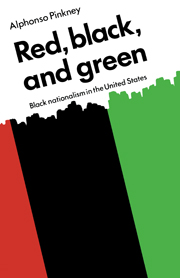Book contents
- Frontmatter
- Contents
- Preface
- 1 Introduction
- 2 The black nationalist tradition
- 3 Marcus Garvey and the Universal Negro Improvement Association
- 4 Malcolm X and the rise of contemporary nationalism
- 5 The impact of contemporary nationalism on the black community
- 6 Revolutionary nationalism: the Black Panther Party and other groups
- 7 Cultural nationalism
- 8 Religious nationalism
- 9 Educational nationalism
- 10 Black nationalism and liberation
- Epilogue
- Notes
- Index
9 - Educational nationalism
Published online by Cambridge University Press: 02 February 2010
- Frontmatter
- Contents
- Preface
- 1 Introduction
- 2 The black nationalist tradition
- 3 Marcus Garvey and the Universal Negro Improvement Association
- 4 Malcolm X and the rise of contemporary nationalism
- 5 The impact of contemporary nationalism on the black community
- 6 Revolutionary nationalism: the Black Panther Party and other groups
- 7 Cultural nationalism
- 8 Religious nationalism
- 9 Educational nationalism
- 10 Black nationalism and liberation
- Epilogue
- Notes
- Index
Summary
It is quite likely that the oppression of Afro-Americans could not have succeeded to the extent it has in the United States if the educational system had not operated to promote and sustain black subordination. For a people who have been forced into a castecolonial situation, control of the education of their youth is crucial for the oppressor if the system is to be maintained. Therefore, the demands by black students for Afro-American studies programs and courses at all levels of the educational system may be seen as a necessary component of the black liberation struggle. At the same time, the resistance they faced from the administrators of whitecontrolled schools may be seen as an attempt to preserve their subordinate status in the society, or at the very least to remain aloof from the struggle for black liberation.
Since the second half of the 1960s, the number of Afro-American studies programs and courses in the United States has multiplied, mainly as a result of the insistence of the students themselves. The introduction of such programs and courses has paralleled the spread of black nationalist ideology among Afro- Americans. Historically American colleges and universities have offered few courses concerned with the experience of Afro- Americans, and those few courses that did exist usually presented a biased and distorted view. Even fewer courses were offered on the secondary level.
When such courses were first introduced, concern about their validity was expressed by educational administrators throughout the country.
- Type
- Chapter
- Information
- Red Black and GreenBlack Nationalism in the United States, pp. 177 - 204Publisher: Cambridge University PressPrint publication year: 1976



